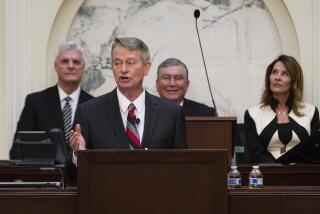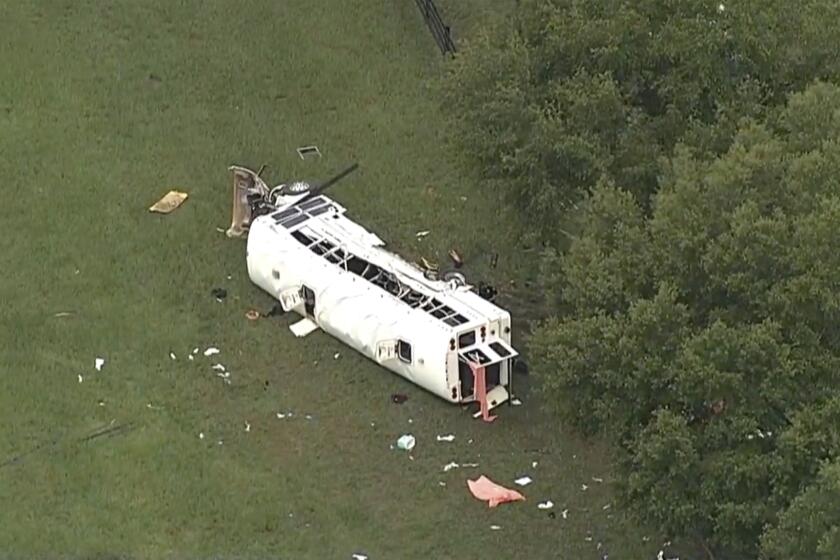Reactions Strong and Divided
Religious organizations condemned the ruling; civil libertarians applauded it. The American Medical Assn. attacked it; individual doctors supported it. Bioethicists were split.
But from all directions, the reactions to the federal appeals court decision approving physician-assisted suicide were swift and emotional. The one thing everyone agreed on was the decision’s enormous import.
“Hallelujah,” proclaimed Kelly Scott, public policy director of the Northwest AIDS Foundation in Seattle, which filed a friend-of-the-court brief in the case. “I’m not sure if this will lead to more physician-assisted suicides by those with AIDS. But for those who are facing death with AIDS, or even having to think about it, court recognition of their private right to die with dignity will give them a lot of peace.”
Burke Balch, director of the National Right to Life Committee’s Department of Medical Ethics, predicted dire consequences. “No one should think that this ruling can be applied only to those who ‘voluntarily’ say they seek death. Court decisions in virtually every state have established that when a competent person is given a ‘right,’ an incompetent person must have the same ‘right,’ which may be chosen for him/her by a guardian or other third party. Thus, this decision threatens people--like those with Alzheimer’s disease and other conditions that fog their mental abilities--with death, even though they never asked for it and may not wish it.”
But Dr. Thomas A. Preston, a Seattle cardiologist and a plaintiff in the case, applauded the decision and contended that predictions of involuntary euthanasia are without foundation. “That just doesn’t follow. Our society has never said that just because we allow alcohol we will allow heroin,” Preston said.
He said the ‘slippery-slope’ arguments being advanced by opponents of physician-assisted suicide parallel those made 15 years ago “when doctors started to withdraw ventilators from patients who requested it. The fact is that nobody really has charged that the medical profession has abused this practice since we have been allowed to do it.” And he said that clear guidelines could be developed to provide safety against potential abuses.
Nonetheless, the American Medical Assn., which has long opposed physician-assisted suicide, lamented the ruling. “We would stand by our stance that it would be unethical for a physician to participate in an assisted suicide, which would be the active killing of a patient.”
Rarely has an issue found itself so squarely at the intersection of private faith and public values. The response in the religious community was particularly strong, even though the 9th Circuit decision specifically said that in finding constitutional protection for physician-assisted suicide for terminally ill, mentally competent adults, it was not granting broad license for euthanasia, also known as mercy killing.
The Catholic Church has long opposed euthanasia, branding it “a grave violation of the law of God” in a 1995 Papal Encyclical.
Mark Chopko, general counsel of the U.S. Catholic Conference, called the ruling “a novel and dangerous expansion of the law.” Speaking for the nation’s bishops, Chopko said, “The decision has pushed the law into obliterating a distinction that has long been recognized--not just in the law but in medicine--” between withdrawing medical assistance and taking active steps to hasten death.
John Stumme, a spokesman for the 5.2-million-member Evangelical Lutheran Church in America, agreed. “The ECLA sees a clear difference between letting a person die and deliberately destroying life,” he said.
“There will be a substantial reaction, a negative reaction,” said Rabbi Lawrence Goldmark, the incoming president of the Board of Rabbis of Southern California. “Granted there are many people that we all unfortunately know and have probably experienced in our own families, who have suffered terribly. . . . However, to pass a law . . . that deals with this on a general basis is fraught with a tremendous amount of fear,” Goldmark said.
While religious leaders are overwhelmingly opposed to assisted suicide, opinion is by no means unanimous. In January, the Episcopal Diocese of Newark led by liberal Bishop John Spong declared that committing suicide or helping someone else commit suicide may be morally acceptable for Christians when “pain is persistent and/or progressive; when all other reasonable means of amelioration of pain and suffering have been exhausted; and when the decision to hasten death is truly informed and a voluntary choice free from external coercion.” But that is not the position of the national Episcopal Church.
Two of the nation’s leading bioethicists clashed on the ruling’s merits. “This is wonderful,” said Margaret P. Battin, a philosophy professor at the University of Utah, author of “The Least Worst Death: Essays in Bioethics on the End of Life.”
“I think it is a decision that in the end will mean greater protection for patients,” Battin said. “We know from a lot of published studies, including some in the New England Journal of Medicine, that physician-assisted suicide occurs at modest levels” behind closed doors. “If this ruling makes it possible for these acts to happen in the open, that is a real gain for patients. I also think it will mean that people in this country--both those who are now ill and those who are still healthy--will have far less fear of dying because they will be less likely to find themselves in positions where they can no longer control the way they die.”
But Arthur Caplan, director of the University of Pennsylvania’s Center for Bioethics, expressed deep concern about the decision.
“A courtroom is a terrible place to resolve deeply divisive social issues such as assisted suicide,” Caplan said. “If we’ve learned anything from the national agony over abortion, it is that tough, contentious questions of morality need to be settled at the ballot box, not by a judge or a panel of judges.”
He said the decision “will lend tremendous momentum to legitimize and legalize assisted suicide,” predicting that it would spur new legislation and ballot measures. “But we should not ignore the very real irony of a nation tottering toward a situation in which there is a legal right to be killed by the doctor but no right to see one to receive treatment.”
Jerry Sheehan, legislative director of the American Civil Liberties Union in Seattle, said he hoped that the decision would spur that state’s Legislature to enact a statute advocated by the ACLU that would form specific protective guidelines for patients and physicians to follow “in implementing this individual right.”
More to Read
Start your day right
Sign up for Essential California for news, features and recommendations from the L.A. Times and beyond in your inbox six days a week.
You may occasionally receive promotional content from the Los Angeles Times.





